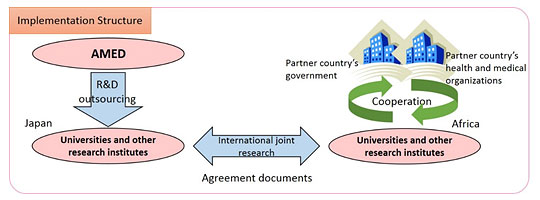International Collaborative Research Program for Tackling the NTDs (Neglected Tropical Diseases) Challenges in African countries
Outline
| Key Fields | Basic Research for Medical Innovation, Infectious disease |
|---|---|
| R&D phase | Basic Study, Applied Study, Nonclinical Study/Pre-clinical Study |
| Contact |
|
This program will be implemented at universities and other research institutes both in Japan and African countries to achieve the goal of controlling NTDs. The program covers research and development in the medical and public hygiene fields, including from basic research to the establishment of methods for diagnosis, surveillance, prevention, drug discovery and treatment. It also includes research on proposing policies and operations, such as a public-hygiene system to control NTDs, based on the results of the aforementioned research and development. During these activities, through close cooperation at local sites, centers for international joint research and cooperative activities will be established to help local researchers continue and extend their efforts over a long period. These centers are also expected to provide training and education to prospective young African researchers with the aim of contributing to innovation in Africa.
Twenty infectious diseases* designated by the World Health Organization as neglected tropical diseases (NTDs), which must be controlled by humankind.
* Buruli ulcer; Chagas disease; Dengue and Chikungunya; Dracunculiasis (guinea-worm disease); Echinococcosis; Foodborne trematodiases; Human African trypanosomiasis (sleeping sickness); Leishmaniasis; Leprosy (Hansen's disease); Lymphatic filariasis; Mycetoma, chromoblastomycosis and other deep mycoses; Onchocerciasis (river blindness); Rabies; Scabies and other ectoparasites; Schistosomiasis; Soil-transmitted helminthiases; Snakebite envenoming; Taeniasis/Cysticercosis; Trachoma; Yaws (Endemic treponematoses).

Implementing Body
| Title of Research and Development | Research on the diagnostics of early or latent eumycetoma: Search for new biomarkers, POC diagnostics, and development of a clinical epidemiology platform |
|---|---|
| Representative institutions | Nagasaki University |
| Principal Investigator | KANEKO Satoshi |
| Foreign representative institutions(Country) | University of Khartoum(Sudan) |
| Summary of research and development | This project is designed with a collaboration between the specialized centers related to the project aim in Sudan and Japan; the Mycetoma Research Center at the University of Khartoum, the only center designated by the World Health Organization to specialize in the clinical mycetoma research; the Institute of Tropical Medicine, Nagasaki University, the only research institute in Japan advocating tropical medicine; Medical Mycology Research Center, Chiba University, also the only center advocating fungal medicine; and the Institute of Transformative Bio-Molecules, Nagoya University, established as a novel center for synthetic chemistry, catalytic chemistry, systems biology, and animal and plant sciences. With the collaborations and harmonization, the four unique institutions will develop new diagnostic methods in the early or latent stages of infection; alternative methods to the current diagnosis and system improve the diagnostic accuracy for fungal mycetoma neglected tropical diseases. Research and development have not progressed. We will operate five subprojects under the project. The first one is on the epidemiological platform, which will serve as the basis for development. The second one is that of research on metabolites found explicitly in the infected persons. The third one is for the clinical application of the LAMP PCR method for unequipped health facilities. The fourth one is to understand the distribution of pathogenic fungi in soil using environmental DNA technology to improve diagnostic accuracy. The fifth one is for human resource development for young researchers under the other four subprojects. Each subproject will collaborate with Sudanese counterparts, and researchers from both countries will work closely to complete the project's aim. Each subproject is described below. |
Results Report
Management Framework
- PS(Program Supervisor)
-
- TANIGUCHI Kiyosu, M.D., Ph.D., Honorary Director, NHO Mie National Hospital / Visiting Professor, Mie University
- PO(Program Officer)
-
- SUZUKI Yasuhiko, Ph.D., Deputy Director & Specially Appointed Professor, Hokkaido University Institute for VaccineResearch and Development
Last updated 06/17/25

